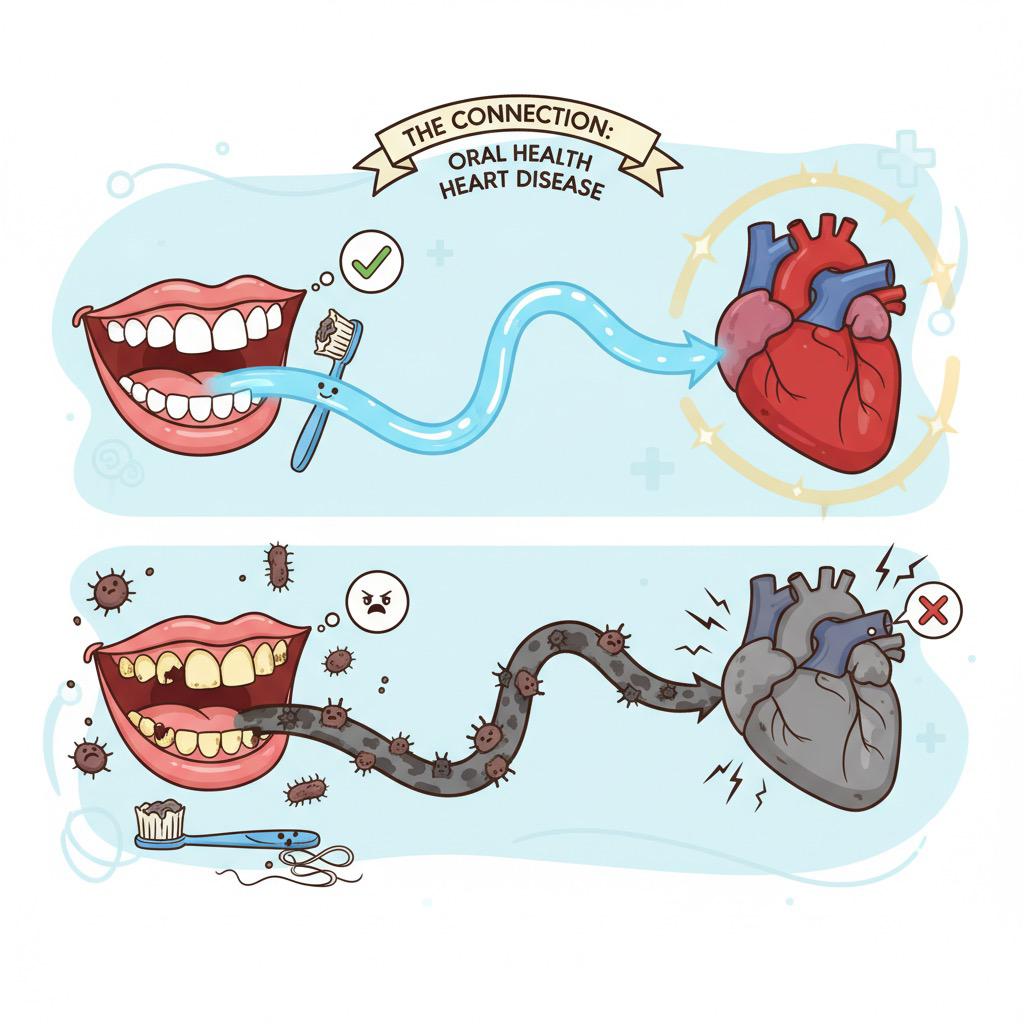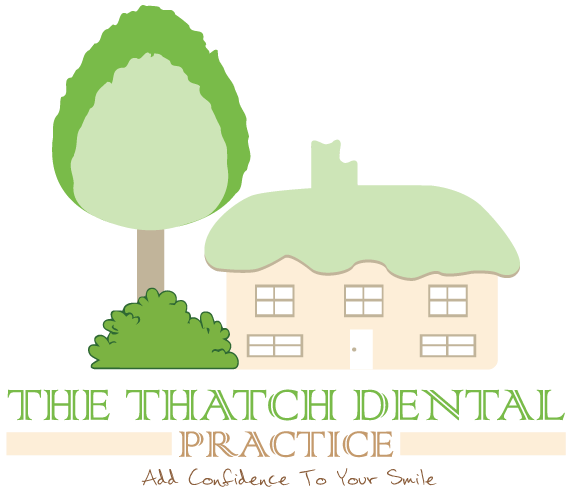The Connection Between Oral Health and Heart Disease

Problem: What Your Mouth Says About Your Heart
When people think of heart disease, they usually picture high blood pressure, cholesterol issues, or lack of exercise. But very few stop to consider how their mouth might play a role. Poor oral hygiene doesn’t just lead to gum problems — it can be a hidden contributor to heart issues as well.
Research has shown a clear link between gum disease and cardiovascular problems. According to Centers for Disease Control and Prevention (CDC), nearly 47% of adults aged 30 and older have some form of gum disease. At the same time, heart disease remains the leading cause of death globally. These numbers may seem unrelated, but medical research is drawing an increasingly clear line between the two.
When gum disease develops, harmful bacteria build up in the mouth. These bacteria can enter the bloodstream through inflamed or bleeding gums. Once inside the bloodstream, they can travel to the arteries and potentially trigger inflammation or plaque buildup — both of which are risk factors for heart problems.
This means a simple habit like skipping daily brushing or ignoring bleeding gums may not just harm your teeth — it could be putting extra pressure on your heart without you even realizing it.
Agitate: How Neglecting Oral Health Raises Heart Risks
Let’s make it real. Imagine someone with mild gum bleeding during brushing. They might dismiss it, thinking it’s nothing serious. But bleeding gums are often an early sign of gum disease. Over time, untreated gum problems can lead to chronic inflammation.
A large-scale study published by American Heart Association found that people with gum disease were almost twice as likely to suffer from heart disease compared to those with healthy gums. The reason? Chronic gum infection can trigger the immune system and lead to inflammation throughout the body. And inflammation plays a key role in narrowing arteries, increasing the risk of heart attack or stroke.
Another case study by Harvard T.H. Chan School of Public Health observed over 50,000 men for more than 20 years. The study found that those with a history of gum disease were significantly more likely to develop cardiovascular problems than those without gum issues.
Here’s why this connection matters:
- Inflammation travels: Bacteria from the mouth can cause inflammation in the blood vessels, making it easier for plaque to build up.
- Blood flow can be restricted: When arteries narrow due to plaque buildup, the heart has to work harder to pump blood.
- Clot risk increases: Oral bacteria can also contribute to the formation of clots, which can lead to heart attacks or strokes.
These are not hypothetical risks — they are supported by growing medical evidence. People who brush irregularly or avoid regular dental checkups may unknowingly increase their risk of serious heart problems down the road.
Even common conditions like gingivitis — often brushed aside — can develop into periodontitis if left untreated. Periodontitis is a more severe form of gum disease that can destroy bone supporting the teeth. The same bacteria and inflammation associated with periodontitis have been linked with artery damage and heart issues.
Real-life example: In a 2018 case review, a 52-year-old patient with untreated periodontitis developed endocarditis, an infection of the heart lining, after bacteria from the gums entered the bloodstream. Though not everyone with gum disease develops heart infections, this case highlighted how oral bacteria can travel far beyond the mouth.
Ignoring gum problems isn’t just a dental issue. It can create a ripple effect that strains your cardiovascular system, making you more vulnerable to long-term health complications.
Solution: Strengthen Your Mouth to Protect Your Heart
The good news is that the link between oral health and heart disease is not a one-way street. By managing oral hygiene, you can reduce the potential risks to your heart.
Here are practical steps backed by research:
1. Brush and Floss Daily
It might sound basic, but it works. Brushing twice a day and flossing once removes plaque and bacteria that cause gum inflammation. A study from European Society of Cardiology found that people who brushed their teeth three or more times a day had a 12% lower risk of heart failure and a 10% lower risk of atrial fibrillation.
2. Schedule Regular Dental Checkups
Seeing your dentist isn’t just about cleaning teeth — it’s an early warning system. Dentists can detect gum disease before it becomes severe. Early treatment of gum disease can help reduce inflammation in the body, which benefits heart health as well.
3. Treat Gum Problems Promptly
If you have symptoms like bleeding gums, bad breath, or receding gums, it’s better to treat them early. Advanced gum disease can be controlled with professional cleanings, scaling, root planing, and proper home care. These treatments help stop bacteria from spreading.
4. Adopt a Heart-Healthy Lifestyle
Oral health and heart health are connected, so improving both together makes sense. A balanced diet, regular exercise, quitting smoking, and managing stress not only protect your heart but also reduce the risk of gum disease.
5. Be Aware of Warning Signs
Many people overlook oral symptoms like persistent bad breath or swollen gums. But these can be early indicators of an inflammatory process. Addressing these signs early can help prevent not just tooth loss but also cardiovascular complications.
Understanding the Science Behind the Link
Researchers believe the connection between oral health and heart disease works through several mechanisms:
- Bacterial Spread: Bacteria in gum infections can enter the bloodstream, attaching to fatty deposits in heart blood vessels.
- Immune Response: The body’s reaction to gum disease triggers inflammation, a known factor in atherosclerosis (hardening of arteries).
- Endothelial Damage: Gum disease may damage the inner lining of blood vessels, making them more prone to narrowing or clotting.
While gum disease doesn’t directly cause heart disease, it contributes to risk factors that make heart problems more likely. That’s why cardiologists and dentists are increasingly encouraging collaborative care for patients with high cardiovascular risk.
Case Study Insight: The Oral-Heart Link in Numbers
- A review of 1,231 patients published in the American Academy of Periodontology showed that people with advanced periodontal disease had a 20% higher risk of developing heart problems.
- A population-based study involving 65,000 adults showed that regular dental cleaning reduced the risk of heart attack by 24% and stroke by 13%.
- Among patients with cardiovascular disease, more than 90% showed signs of gum inflammation.
These findings make it clear: improving oral health can be a practical step in lowering heart disease risks.
Bottom Line: A Healthy Smile Supports a Healthy Heart
Taking care of your mouth is more than just keeping your teeth looking good. It’s a proactive step in protecting your heart health. The bacteria and inflammation associated with gum disease can create serious cardiovascular risks over time — risks that can be avoided with simple, consistent care.
- Brush and floss regularly.
- Don’t skip dental visits.
- Take gum problems seriously.
- Build habits that protect both your mouth and heart.
This isn’t just about avoiding cavities or gum pain. It’s about preventing something much bigger — heart disease. Your mouth can tell a lot about your health, and in many cases, it can be the first sign that something more serious is happening inside.
Your heart and your smile are connected. Take care of one, and you’re also taking care of the other.








